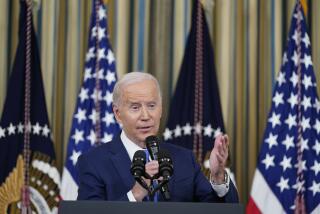Clinton’s Malaysia Visit Downplayed
- Share via
WASHINGTON — The White House has quietly downgraded the status of President Clinton’s planned trip to Malaysia for a 21-nation economic summit next month to avoid appearing to endorse the increasingly repressive rule of Malaysian Prime Minister Mahathir Mohamad, according to senior U.S. officials.
In a sign of U.S. displeasure with Mahathir’s heavy-handed policies after 17 years in power, aides said Clinton will not “officially” visit Malaysia while he attends the Nov. 17-18 Asia-Pacific Economic Cooperation forum in Kuala Lumpur, the capital.
“It’s neither a state visit nor an official visit,” an administration official explained. “He’ll just be there.”
Clinton has played a leading role in APEC since he hosted the regional heads of state at a summit in Seattle in 1993.
Aides said Clinton hopes to use this year’s meeting to forge a consensus for still-undefined action to alleviate the financial firestorm that has swept across Asia, bringing economic hardship and social upheaval to tens of millions of people.
Malaysia is the latest hot spot. Political unrest has roiled the long-stable Southeast Asian nation since the detention last month of ousted Deputy Prime Minister Anwar Ibrahim.
The dissident leader, who says he was beaten while in custody, has become the focus of an international outcry and a rallying point for massive street demonstrations aimed at toppling Mahathir.
Anwar’s trial on charges of bribery and illegally engaging in homosexual acts--charges that he insists are trumped up--is scheduled to begin Nov. 2.
With the APEC summit to start two weeks later, and memories fresh of how street protests forced Indonesian President Suharto from power in May, U.S. officials are openly nervous as they plan Clinton’s trip.
“A lot of people are feeling a little awkward about going,” a senior official said. “All of us are feeling uneasy.”
Few expect the APEC summit to be canceled or Mahathir’s government to collapse in coming weeks.
However, “all bets are off,” the official warned, if demonstrations become violent. At the same time, he added, canceling the APEC session “would send a terrible signal” in the current economic climate.
However, pressure is mounting on Mahathir to moderate his policies.
Indonesian President B.J. Habibie and Philippine President Joseph Estrada, both friends of Anwar, have pointedly refused to commit to attending the APEC conference, citing concerns over his treatment. Several other countries, including Canada and Australia, also have criticized the case.
One Asian diplomat based in Washington, who spoke on the condition that he not be identified, said regional leaders are still privately debating whether this year’s APEC conference can be a credible platform for reaffirming the organization’s commitment to free trade in light of Mahathir’s recent actions.
Although Mahathir is widely credited with bringing prosperity and stability to Malaysia, he also is known as an unpredictable and prickly leader, and his authoritarian style has come under growing criticism now that Malaysia is suffering its first recession in 13 years.
In response, Mahathir has blamed greedy foreign investors and currency traders for the crisis.
Last month, he defied the International Monetary Fund and the United States--not to mention most other APEC members--by imposing stringent curbs on currency and stock trades.
“This puts us in a difficult bind,” the Asian diplomat said. “Mahathir’s decision to go this way actually flies in the face of the kind of economic and policy coordination that we’ve been trying to achieve.”
That worries some U.S. officials, who fear that APEC will lose credibility unless it receives sufficient support from regional leaders.
After weeks of leading anti-Mahathir rallies, Anwar was arrested Sept. 20 and has been held under the harsh Internal Security Act, which allows indefinite detention without trial.
Anwar appeared in court nine days later with a black eye and bruises. He said he had been handcuffed, blindfolded and beaten in jail until “I virtually passed out.”
Although Mahathir was quoted as suggesting that Anwar had inflicted the injuries on himself, he later backtracked and ordered an investigation.
In a statement issued after Anwar appeared in court, the State Department said it was “extremely concerned” that Malaysia “has moved to limit the basic democratic rights of assembly, free speech and open communication.”
It said the ranking Malaysian Embassy official was called in “to convey our concerns.”
Mahathir responded this week with a broadside at the United States. “We run our country in our own way,” he told a news conference Tuesday, according to the Reuters news service. “We also have a number of things we would like to see changed in the American government.”
Times staff writer Evelyn Iritani in Los Angeles contributed to this report.
More to Read
Sign up for Essential California
The most important California stories and recommendations in your inbox every morning.
You may occasionally receive promotional content from the Los Angeles Times.














